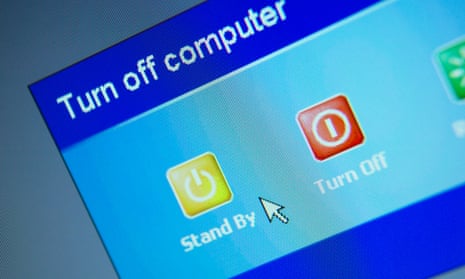The UK and Dutch governments have paid Microsoft multiple millions to extend support for Windows XP past the 8 April cutoff date.
The UK extension cost £5.5m but is only valid for a year, after which public-sector users will have to be moved to newer software.
The Crown Commercial Service (CCS), a new central purchasing agency within the Cabinet Office, paid the US software company to provide important security software updates for Windows XP, Office 2003 and Exchange 2003 for the entire UK public sector.
“We have made an agreement with the Crown Commercial Service to provide eligible UK public-sector organisations with the ability to download security updates to Windows XP, Office 2003 and Exchange 2003 for one year until 8 April 2015,” said a Microsoft spokesperson.
That could require the upgrade of thousands of computers. EHI Intelligence calculated in September 2013 that 85% of the 800,000 PCs in the NHS alone were still running on XP at the time. By contrast, 14% were on Windows 7 and 1% on Windows 8.
NHS managers interviewed for that study expressed hope that Microsoft would change its mind on ending XP support, or that there would be a national solution – which appears to have happened with the CCS intervention.
“The NHS is very grateful for this deal,” said Sarah Hurrell of the CCS, according to Computer Weekly.
The support extension will give the NHS and other government departments breathing room to migrate from Windows XP.
A significant number of machines in the public sector remain on Windows XP, according to the Cabinet Office, although plans are in place to ensure that the majority of these are moved to other operating systems over the next 12 months.
The Dutch interior ministry negotiated a separate multimillion-euro deal with Microsoft for about 40,000 PCs still running Windows XP across the nation’s government-owned computers.
12 years and out
Wider extended support for Windows XP, which was released in mid-2001, ends on Tuesday after the operating system was removed from mainstream support in 2009. The date was announced in 2007, giving the government seven years to migrate to newer software – which it hasn’t yet done.
Microsoft will continue releasing virus protection for Windows XP through its Security Essentials application until 14 July 2015.
Up to a quarter of computers in businesses and the public sector will still be running Windows XP after Tuesday, according to data from Gartner, leaving them vulnerable to compromise without continued support.
The CCS claimed the central deal saved the government more than £20m compared with individual departments arranging their own deals with Microsoft.
The extended support deal comes with a requirement that PCs be migrated from Windows XP, Office 2003 or Exchange 2003 within a year. The government expects the majority of machines to be upgraded from Windows XP by April 2015.
To Windows 8 or not to Windows 8, that is the question
Microsoft’s Windows 8 recently hit 200m licences sold, putting it on a par with Windows Vista but well behind Windows 7, which had sold more than 300m in the same time 15 months after its release.
The slow Windows 8 sales forced the computer maker HP to offer Windows 7 – Microsoft’s 2009 replacement for the unloved Windows Vista – saying it was “back by popular demand”.
Public-sector bodies and enterprise Windows XP users face the prospect of upgrading to Windows 7, with its familiar user interface complete with Start menu, or switching to Windows 8, which has confused users with its use of a new “Start Screen” and large tiled interface.
